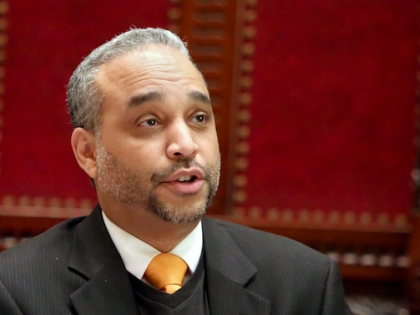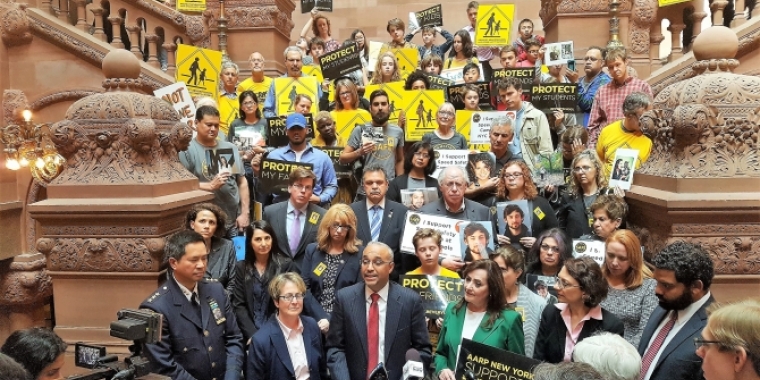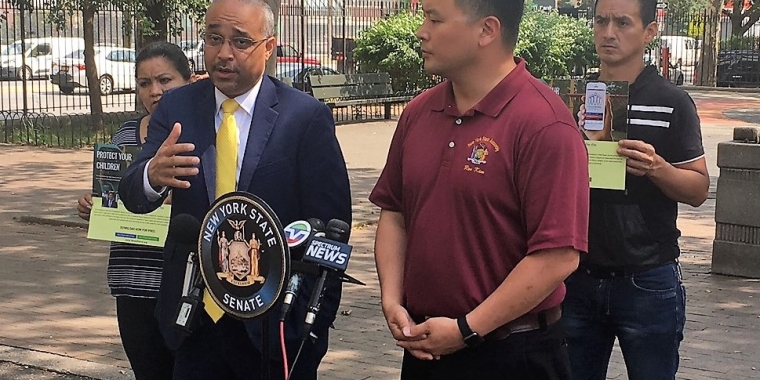
Anti-Illegal Immigration Program, Secure Communities, Stirs Debate In New York
Latin American News Dispatch
by Amy Elmgren
November 29, 2010
A new federal program called Secure Communities makes many residents of New York feel anything but safe.
Piloted in 2008, the policy requires local police to share the fingerprints of everyone they arrest with Immigration and Customs Enforcement (ICE) officials, and to detain and deport those who are here without visas. Secure Communities has been implemented in 33 states and will take effect in New York this fall, unless residents at the state or municipal level are given the choice to opt out.
Enforcement programs like Secure Communities — which ICE expects to implement in every state by 2013 — form one aspect of President Barack Obama’s immigration agenda. The Department of Homeland Security has deported 392,000 undocumented immigrants in 2010 to date, surpassing the 2009 record total of 387,790.
Earlier this year, legislators in the state of Arizona passed what is considered the toughest immigration measure yet — a bill called SB 1070 that requires police to detain any person they think might be in the country unauthorized, and makes it a crime for immigrants not to carry their immigration documents with them at all times. Opponents fear that the bill will encourage racial profiling, and President Obama and other officials as well as human rights groups have criticized it. In New York, some see Secure Communities as a step in the direction of the Arizona measure.
“I believe that Secure Communities will create insecure communities,” New York City Councilman Daniel Dromm told an audience of Hispanic and South Asian residents packed into a high school auditorium in the New York borough of Queens. Dromm, who chairs the council’s immigration committee, said he thinks the program will “turn the immigrant community away from working with the police.” He joked that local residents’ fear of being asked to show their papers is so great that they won’t even jay walk when an officer is in sight.
Roslina Abdul from Queens Community House, a local nonprofit, said that one of the men in its program had been deported after a woman told the police he had touched her on a crowded subway train. Abdul said that throughout the process, “his family was unable to get information about his case because of language barriers and their own fear of getting involved because of their own immigration status.” She also shared the story of her own brother-in-law, who was deported to Bangladesh after a customer dissatisfied with his service at the restaurant where he worked called the police.
“There are many stories that will not be told tonight because of fear,” Abdul added.
Because of situations such as these, local residents perceive programs such as Secure Communities as ICE efforts to target not just violent criminals, but all undocumented immigrants and the communities they live in. Officials and residents said that this fear leads to less cooperation with police and an increase in crime.
“Police officers have always told me that they don’t like mandates like this because it erodes the trust and they can’t get information,” State Senator José Peralta, a first-generation Dominican American who represents parts of Queens, said in a phone interview. “One of the biggest complaints they have is that people in the Corona (Queens) area don’t complain to the authorities when there’s a crime,” he added. Peralta argued that Secure Communities has no place in a state like New York “that is so vibrant because of the immigrant community.”
Richard Alba, an immigration specialist at the State University of New York in Albany, said that trust between the police and the people they serve “is critical in dealing with criminal matters.” A program that brings ICE and law enforcement closer together “perverts local police forces and takes them away from what should be their proper function, which is maintaining safety of local residents, whoever they may be,” he added, in a telephone interview.
New York State’s Department of Criminal Justice Services enrolled in Secure Communities on May 10, when acting commissioner Sean Byrne signed a Memorandum of Agreement with ICE, acting with the governor’s approval.
In an e-mail, department spokesman John Caher said, “New York State’s, and this agency’s, role in Secure Communities was rather limited. Basically, all we did was make it possible for local jurisdictions to determine whether they want to participate. We are neither encouraging nor discouraging participation; it’s a local decision.”
But the Department of Homeland Security may have determined otherwise. Department secretary Janet Napolitano announced at an Oct. 6 press conference that Washington, DC, Santa Clara, CA, and other cities and counties that have voted to abstain from the program do not have that choice. “We do not really see this as an opt-in, opt-out program,” she was quoted as saying by The Washington Post. This contradicts an Aug.17 memorandum issued by ICE and a letter Napolitano sent to Congress on Sept. 7 stating that ICE and state criminal justice agencies could consider removing dissenting jurisdictions from the Secure Communities deployment plan.
Peralta said that he and other state officials have sent a letter to New York State Governor David Patterson requesting that he suspend or terminate the state’s memorandum of agreement with ICE. They have also brought up the issue with Governor Elect David Cuomo, he added.
The state senator assured his constituents, “You have elected officials—Latinos and non-Latinos—that will stand up and fight it, and make the governor aware of what has to be done on the state level and on the city level.”
Councilman Dromm promised that the New York City Council would hold a hearing on Secure Communities “very soon.”
“This has been slipped in the door without too much notice, and our biggest fear is that this will be implemented before there is anything we can do either as elected officials or as members of the immigrant community,” he stated.
Napolitano and ICE Director John Morton praised Secure Communities as an integral piece of the Obama administration’s immigration enforcement efforts at the Oct. 6 press conference in Washington. They said that 59,000 “convicted criminal aliens” — 21,000 of whom had committed “major violent offenses” such as murder and rape — had been detained through the program this year alone.
At the same time as his administration pushes for Secure Communities, Obama has stated the need for a path to citizenship for the more than 11 million undocumented immigrants who currently reside in the U.S. Some speculate that his tough enforcement measures are calculated to win over moderates and conservatives on immigration reform.
“I truly believe that in the long run, they want to achieve immigration reform; whether this is the right strategy, I can’t say,” Professor Alba said of the Obama administration.
ICE and New York Police Department officials declined to comment for this article.


